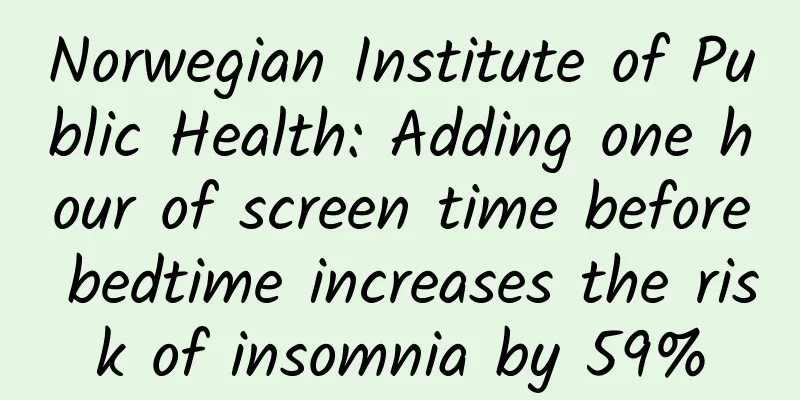Norwegian Institute of Public Health: Adding one hour of screen time before bedtime increases the risk of insomnia by 59%

|
Screen time before bed could seriously harm your sleep, a massive new study suggests. Researchers found that even an extra hour of screen time before bed increased the odds of insomnia and shortened overall sleep duration. Contrary to expectations, social media was no worse than other screen activities — all types of activity had the same effect. Using screens in bed at night is likely to reduce sleep quality, but using social media is no worse than using any other form of screen. Scientists believe it's not the content that causes the problem, but the reduced sleep itself, further confirming that turning off screens before bed may be a simple step to better sleep. Using screens in bed may be more detrimental to your sleep than you think. A large-scale survey of 45,202 young people in Norway found that using screens for just one hour before bedtime increased the risk of insomnia by 59% and reduced sleep time by 24 minutes per night on average. Interestingly, it didn’t matter what people were doing on their screens — whether it was browsing social media, watching videos or reading. The biggest factor wasn’t the type of activity, but the total amount of time spent on screens in bed, according to Gunnhild Johnsen Hjetland, PhD, of the Norwegian Institute of Public Health and lead author of the study published in Frontiers in Psychiatry. "The type of screen activity does not seem to be as important as the total time spent using screens in bed," said Gunnhild Johnsen Hjetland, PhD, of the Norwegian Institute of Public Health and lead author of the paper published today (March 31) in Frontiers in Psychiatry. "We found no significant differences between social media and other screen activities, suggesting that screen use itself is a key factor in sleep disruption - perhaps due to time misalignment, with screen use taking up time that would otherwise be spent resting, thus delaying sleep." Sleep is essential for both physical and mental health, but many people struggle to get enough of it, especially young people. One increasingly common habit that may be disrupting sleep is screen time in bed. Researchers believe screens can affect sleep in a number of ways:
"Sleep problems are highly prevalent among students and have significant impacts on mental health, academic performance, and overall well-being, but previous research has focused primarily on adolescents," Hjetland said. "Given the widespread use of screens in bed, we aimed to explore the relationship between different screen activities and sleep patterns. We expected that social media use might be more strongly associated with poorer sleep quality due to its interactive nature and potential for emotional stimulation." To investigate, the scientists used the 2022 Student Health and Well-being Survey, a nationally representative study of Norwegian students. They surveyed 45,202 full-time higher education participants, aged 18-28 years. They first asked participants whether they used screens after bedtime and for how long. Then, they asked participants to identify their chosen activity: watching a show or movie, playing a game, using social media, browsing the internet, listening to audio such as a podcast, or reading study-related material. Participants were also asked to report their bedtime and wake-up times, as well as how long it took to fall asleep, how often they had trouble falling asleep or staying asleep, how often they felt sleepy during the day, and how long their sleep problems lasted. Insomnia was defined as difficulty sleeping and excessive daytime sleepiness at least three times a week for at least three months. The scientists then divided the responses into three categories: one in which the participants said they only used social media, one in which the participants did not mention social media, and one in which the participants selected several activities including social media. The scientists found that for every additional hour of screen time before bed, there was a 59% increase in insomnia symptoms and a 24-minute decrease in sleep duration. However, social media use was no more harmful than other screen activities. There was no significant interaction between screen time and activity choice, suggesting that the activity itself did not affect the amount of time people stayed awake. This suggests that screens reduce sleep time because they replace rest, not because they increase wakefulness: different activities affect wakefulness differently. “If you have trouble sleeping and suspect screen time may be contributing to your sleep deprivation, try reducing screen time in bed, ideally at least 30-60 minutes before bedtime,” Hjetland advises. “If you do use a screen, consider disabling notifications to minimize nighttime interruptions.” However, the scientists cautioned that their study focused on a single culture. The relationship between screen use and sleep may vary significantly around the world. In addition, some activities that may have different effects on sleep, such as listening to music or playing games, were grouped together in order to compare social media use with other screen activities. “This study cannot determine cause and effect — for example, whether screen use causes insomnia or whether students with insomnia use screens more,” Hjetland noted. “The study also did not include physiological assessments, which would have provided more accurate insight into sleep patterns.” |
>>: Learn about abnormal uterine bleeding in a few minutes
Recommend
What is the best way to treat vaginal itching?
Vaginal itching generally refers to vulvar itchin...
What department should I go to for blood test hcg
When pregnant women reach a certain stage, they u...
Generally, nausea starts in a few months of pregnancy
Pregnancy is a process that every woman must go t...
Women's daily necessities
Women's daily necessities mainly include the ...
I have the flu and my bones ache all over. What's going on?
It is the end of winter and the temperature is st...
Night Listening | Konjac, as a weight loss tool, is really not a "tax on IQ"!
Konjac has long been known as a perfect weight lo...
Hair color
Hair dyeing has become a fashion now. Many young ...
What to do if your pelvis is wide after giving birth
After giving birth, the mother's pelvis will ...
What are the dangers of female adnexal cysts?
Adnexal cysts are a relatively common gynecologic...
How to deal with hunger during early pregnancy
Many female friends who are pregnant find that th...
Is breast tenderness normal during pregnancy?
There will be many changes in the body during pre...
Can I eat cod during menstruation?
With the improvement of living standards, many pe...
Can I eat star anise during menstruation?
Star anise is a condiment that is often used in d...
Yaowa Quiz | Can clarithromycin be taken together with nifedipine?
Clarithromycin belongs to the macrolide antibioti...









